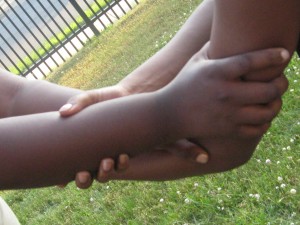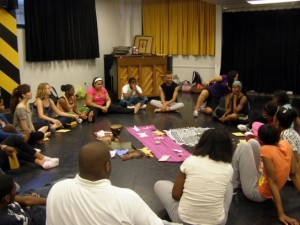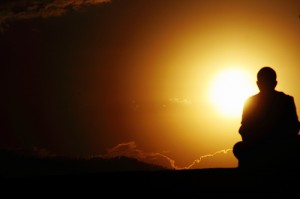Love Notes: From Aimee to Darnell
Dear Darnell,
I always find myself in love or falling there. My lovers are many, most of them unknown – yet to be revealed – though they surround me. You are one of them.
 My most supportive and gratifying, tragic and fatally-flawed relationships emerged working in community. I don’t know if this means I am an agent of change or that I am just clinging desperately to the idea of what a radical difference might feel like–in my bones and through and across our own differences. While immersed in projects overtly committed to social justice or within non–profit institutions where the ostensible publicly guided mission was to work towards chipping away at the consequences of a too narrowly defined injustice, I found my most intense lovers, my most haunting loves.
My most supportive and gratifying, tragic and fatally-flawed relationships emerged working in community. I don’t know if this means I am an agent of change or that I am just clinging desperately to the idea of what a radical difference might feel like–in my bones and through and across our own differences. While immersed in projects overtly committed to social justice or within non–profit institutions where the ostensible publicly guided mission was to work towards chipping away at the consequences of a too narrowly defined injustice, I found my most intense lovers, my most haunting loves.
In graduate school, buoyed by a healthy dose of idealism and, perhaps, a skewed understanding of my own capabilities, I became the director of a homeless shelter for young women in Detroit. For nearly a decade this shelter and the women I met there schooled me in love. Although I was comfortable reading, writing and constructing grand plans of transformation for black girls, I was something other than comfortable when my well-intentioned, high-minded ideas were met with hostility and the grounds for my occupation of space and authority there questioned. Both the shelter residents and residential staff members were women who overwhelmingly self-identified as African American. Reflected and refracted, we saw ourselves in one another and very often read our images like fragmented pieces of a whole we yearned for and resented. I doubt that any of us expected to be unconditionally loved in this space, but I also doubt that we expected to be so powerfully led by our personal desires and aversions. After all, unemployment, isolation, lack of familial support, institutional hostility, physical, sexual, and emotional abuse, self-loathing, sexism, racial oppression and apathy were just some of the ever present, agreed upon enemies we named before entering the shelter space we shared, albeit marked by obvious, imbalanced degrees of power and privilege. There was plenty to fight against, why include one another in the fray?
During staff meetings originally scheduled for an hour that morphed into four hour testimonials/readings/healing sessions/philosophical debates; countless late night conversations with young women on couches, under blankets and over TV; in the icy silence that passed between us as we walked down hallways when it was easier to ignore rather than express or ask forgiveness for a hurt, we blurred the difference between fighting against and fighting for. Without love, I believe, the distinction might have been clearer. Without love, these distinctions are always clearer.
 Robin D.G. Kelley reminds us that “there very few contemporary political spaces where the energies of love and imagination are understood and respected as powerful social forces.” And, yet, I believe we recognize glimpses of the love and imagination that it takes to nurture and sustain these spaces in ourselves and others every day, every minute. Fear, however, of those external social forces that have proven to be successfully oppressive makes it seem logical to invest in the belief (however subconscious) that they are far more skillfully destructive than our love can be regenerative.
Robin D.G. Kelley reminds us that “there very few contemporary political spaces where the energies of love and imagination are understood and respected as powerful social forces.” And, yet, I believe we recognize glimpses of the love and imagination that it takes to nurture and sustain these spaces in ourselves and others every day, every minute. Fear, however, of those external social forces that have proven to be successfully oppressive makes it seem logical to invest in the belief (however subconscious) that they are far more skillfully destructive than our love can be regenerative.
I encounter and try to counter this pessimism in myself too frequently to quantify, and watch as it takes hold of students confronted with injustice in ways they have felt but are for the first time forced to untangle at its root through their classroom encounters with the historical tenacity of fear, ignorance and hate. Unsentimental encounters with oppression and the brilliant fortitude of its countless creative resistors emboldens my students, but sometimes less so than it overwhelms. Five minutes before class, the room is already humming with a persistent buzz. Depending on what we are discussing, reading, watching or performing on that day, the buzz can feel earnest and light or chaotic, confused and fearful. Rather than ignore it or put it in a box for 75 minutes, we have to acknowledge, touch and sit with it before we can invite power, identity, community, capitalism and transformation into the room. So, this semester we start each class with meditation. I see you rolling your eyes. But it is real; it is for real. In this case (in all cases) meditation is not filler or a touchy feely moment, but the very moment that enables our capacity to be in touch in the ways necessary for us to pay attention and be present. We sit without fidgeting or fumbling with our smart phones, aware of what we are carrying with us into the classroom and into our brief engagement on that day with one another. We may be present but this doesn’t mean that we are at ease. But, I believe it is from being with, forgiving and moving forward from this place of dis-ease that we make room to listen to ourselves and genuinely hear one another–regardless of whether or not we like the sound of what comes to our ears and spirits. These difficult, yet wide-open and willfully present, moments are love to me. Definitely not romantic or heart stirring in the ways that inspire swooning or chirping blue birds to circle, but, perhaps, when practiced with commitment, become something far more transformative and sustainable.
 The most productive theories on how we can live and allow others to live in ways that are more fully human are rooted in a love that is self-aware, self-reflective and demanding. I think about what I learned growing up, through implication and osmosis, about what lovers should expect and demand from one another. And, this usually meant asking for something that would somehow fill the space in and around me and make the dark and scary world of my interior life seem less threatening. With someone else around, in someone else’s arms, embedded in someone else’s desires, maybe the maddening work of sitting with myself would feel less obligatory. I don’t know, though. I have yet to be placed in the circumstances that would allow me to figure that one out.
The most productive theories on how we can live and allow others to live in ways that are more fully human are rooted in a love that is self-aware, self-reflective and demanding. I think about what I learned growing up, through implication and osmosis, about what lovers should expect and demand from one another. And, this usually meant asking for something that would somehow fill the space in and around me and make the dark and scary world of my interior life seem less threatening. With someone else around, in someone else’s arms, embedded in someone else’s desires, maybe the maddening work of sitting with myself would feel less obligatory. I don’t know, though. I have yet to be placed in the circumstances that would allow me to figure that one out.
Thankfully, it has been through my relationships with the women I worked with in community and in my closest adult friendships, especially ours, that I have learned something else about love. I have learned about the beautifully cunning way aversion, discomfort and dislike can reveal themselves to me as myself, and keep me from identifying the family that has already drawn me in its arms. I have learned how the compassion that comes from sitting with myself and paying attention to the urgent whispers of intuition brings me to what I know to be true, even if in that moment that truth is simply the reality of my own anger and confusion. Visceral spaces have stories to share, guidance to offer. I have learned that confronting myself is the seed of a love with very deep and expansive roots–a love that can shape indignance into a righteous anger that compels me to be mad enough to act in service of the world we imagine. I have learned that I will never stop learning, and because of this await the next uncomfortable moment, mean read, challenging interaction, terrifying silence, intractable disagreement seeming betrayal or break that just may be love’s brilliant disguise.
With love,
Aimee

12 Comments